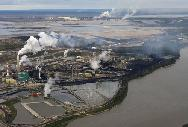Panel pushes debate on carbon tax
 (By Bill Curry) - Ottawa, Canada — The Canadian economy can transform itself into a clean-running green machine by 2050, slashing its emissions by more than half with very little economic pain, say the authors of a new report from the National Round Table on the Environment.
(By Bill Curry) - Ottawa, Canada — The Canadian economy can transform itself into a clean-running green machine by 2050, slashing its emissions by more than half with very little economic pain, say the authors of a new report from the National Round Table on the Environment.The federally-funded advisory panel is urging government leaders to quickly put a “strong” price on industrial emissions of greenhouse gases and air pollutants and says the sooner the better for both the economy and the environment.
The report urges Canadian politicians to focus the debate on either a carbon tax, a cap and trade system, or both.
A carbon tax would force industry to pay a fee for every tonne of harmful emissions released into the atmosphere. A cap and trade system would allow companies to emit up to a specific cap. Permits to emit above the cap would have to purchased from companies that have lowered their emissions below their cap.
“Our findings suggest that in the long-run, the overall effect on Canada’s gross domestic product will not be significant, amounting to the equivalent of approximately one to two years of ‘lost growth’ of GDP between now and 2050,” said David McLaughlin, the President and CEO of the panel.
Former environment minister Rona Ambrose had asked the round table in November 2006 for advice on how Canada could meet the Conservative government’s 2050 targets to reduce air pollutants and green house gases.
Specifically, the government is promising to reduce Canada’s emissions within the range of 45 to 65 per cent from 2003 levels by 2050.
The panel said it is too early to say exactly what the price on carbon emissions should be and pledged to explore the specifics of a carbon tax and cap and trade system in a future report.
The Conservative government’s April 2007 plan said companies would be allowed to pay $15 per tonne into a Climate Change Technology Fund to comply with yet-to-be-published regulations that will take effect in 2010. The plan calls for the price to increase to $20 during the 2010 to 2017 period. Companies can use this method to comply with 70 per cent of their targets in the beginning, but by 2017, only 10 per cent of their target can be achieved by paying into the fund.
The Conservative plan also says Canadian companies will be allowed to use a cap and trade system, but it would be different than what the round table is calling for today.
The panel wants Canada to follow the European model, where a company’s emissions cap is measured in megatonnes. The federal government is proposing a trading system based on intensity targets, meaning the emissions per unit of production is capped but not a company’s absolute emissions.
As today’s report points out, an intensity approach can allow emissions to grow as production increases.
The three opposition parties jointly proposed amendments in the previous Parliament for federal environment laws to penalize emitters by between $20 and $30 for every tonne of emissions above Canada’s Kyoto targets from 2008 to 2012.
Environment Minister John Baird issued a written statement in response Monday that made no mention of the report’s central call for governments to put a strong price on carbon.
“We agree that we must work in concert with the world, that policy certainty beyond the short-term is central, that technology deployment is imperative, and that an integrated approach to climate change and air pollution should be pursued,” he said.
The minister’s office said Mr. Baird would not be available for media interviews Monday to discuss the report.
Early reaction to the report from the Canadian environmental movement is positive.
“It is tremendously significant that the National Round Table-with its predominantly business membership-has concluded that carbon emissions pricing is essential for Canada to meet its targets,” said Stephen Hazell, executive director of Sierra Club of Canada, in a statement. “Canada’s environmental community has advocated a carbon tax almost unanimously as far back as the 1989 Greenprint for Canada recommendations to then Prime Minister Brian Mulroney. The National Round Table report to Environment Minister John Baird may persuade the federal government to act at last.”
The federal Green Party, which has long called for a carbon tax, also praised the report.
Party leader Elizabeth May noted in a release that a $50 carbon tax is the “cornerstone” of her party’s election platform.
“Currently, the Green Party is the only federal political party with the courage to tell voters the truth: Canada must price carbon if we are to take meaningful action on climate change and mitigate the climate crisis,” she said.
You can return to the main Market News page, or press the Back button on your browser.

